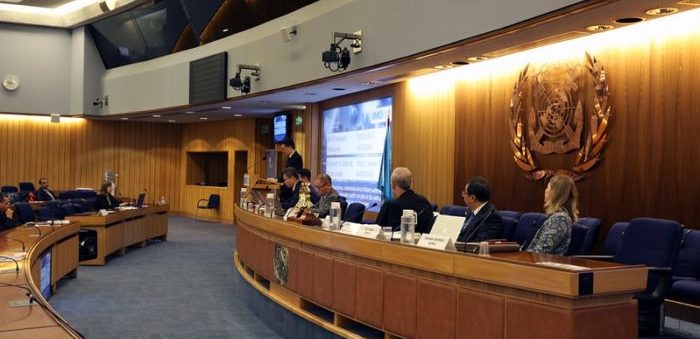IMO and the World Meteorological Organization conducted their first joint Symposium on Extreme Maritime Weather, focusing on the challenging weather conditions and how they affect the shipping industry.
The event “Extreme Maritime Weather: Towards Safety of Life at Sea and a Sustainable Blue Economy” enabled the WMO to discuss the best practices and enh services for safety and risk reduction, emergency response, sustainable shipping practices and greater collection and sharing of ship observations.
The participants also referred to the importance of an accurate and timeliness weather forecast, which has seen an improvement in the last decades; Yet, many are those who are lost at sea because of extreme weather conditions as high winds, large waves, fog, thunderstorms, sea ice, freezing spray and volcanic ash.
Speaking at the event, Nusrat Ghani, UK Parliamentary Under-Secretary in the Department of Transport urged met-ocean and shipping communities to build dialogue on global solutions in shipping and maritime transport, especially in the changing climate.
In the meantime, Peter Thomson, UN Special Envoy for the Ocean added that all these casualties, from people being lost in the sea to loss of cargo, could have been avoided if it was for better information, communication and preparedness measures.
Mr Thompson added that
The good news is that ocean information services are being continually developed, including early warnings and improved predictions.
The participants also commented that except science, coastal communities and local mariners play a crucial role, mostly in the polar regions because the communication bandwidth is restricted.
Thus, John Parker, Environment and Climate Change Canada stated
Canadian Inuit communities play a critical role in the development of future weather and sea-ice products for the Arctic. By working together, we are currently examining how Inuit weather and sea-ice forecasting knowledge combined with western monitoring and modelling techniques could lead to better Arctic forecasts to meet local decision-making needs.
Another issue that was discussed during the symposium was that forecasts need more observations to improve their skills, with Peter Hinchliffe, Chair of the Nautical Institute Executive Board and former Secretary General International Chamber of Shipping, noting that if more data from ships sailing in the sea are collected, this will improve the forecasts.
Only 2500 ships voluntarily provide met data. Out of a total of around 80,000 ships in international trade this is a shockingly small number and efforts must be made to increase the contribution of this vital data to improve forecasting and weather warnings.
In the meantime, Nick Cutmore, Secretary General of the International Maritime Pilots Association (IMPA) said that the industry has to understand the benefits of met-ocean data to the mariners on a daily basis.
Concluding, the symposium’s participants also addressed insurance,investigation and indemnity issues where ocean forecasting can improve decision making by maritime sectors, digital delivery of maritime safety information, decision support in polar regions from short to longer term seasonal time scales, voyage route optimization, decision support for the offshore industry, and search and rescue.
































































